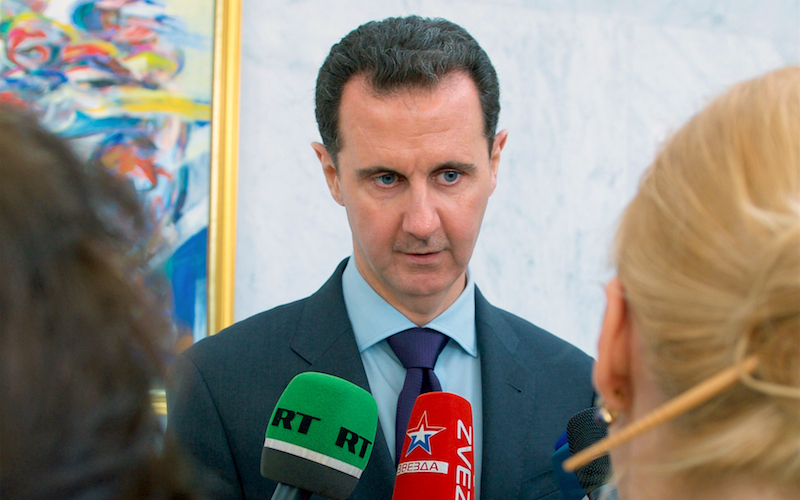
Syria’s Endgame Dilemma after DAESH
War, in addition to its destructive power, is expensive. In 2013, at the backdrop of the Syrian crisis, President Bashar al-Assad cut subsidies on food, water, and electricity, but this was not enough. By 2015, Syria had depleted its foreign exchange reserves. Hence, imported goods became more scarce and expensive. As such within a short period of time, food, water, and electricity prices increased. In some regions, these prices have nearly doubled. At the same time, airstrikes have destroyed much of the infrastructure in Syria. As a result of this, there have been significant shortages in water and electricity within the country.
Last year, government forces liberated Aleppo which is the economic core of Syria. However, years of intense fighting have imposed extensive damage to the city. Currently, the situation in Aleppo is similar to Berlin after the Second World War, and it will take years to repair the basic infrastructure. Meanwhile, the agricultural heartland of Northeast Syria is still contested between Daesh and Kurdish forces, which are out of Assad’s reach. Essentially, these factors imply that Assad cannot rely on the revenues from Syria’s economic and agricultural cores. In a war-torn country, whoever controls the basic needs and services will be perceived as the authority. Thus, food, water, and electricity shortages undermine Assad’s ability to exert control. Even in regions that were retaken by pro-government forces, the authority of Damascus is still in question. The situation in Syria is left unaddressed and it will result in a new crisis.
Currently however, there exists no roadmap to rebuild Syria. In fact, it is not even certain how much the reconstruction will cost. Some say that some estimates can be around $300 billion while others put the budget at around a trillion dollars. Rebuilding Syria is beyond the capacity of the local government and since nobody can afford a black hole in the Middle East, rebuilding Syria will fall upon the global community. Yet, with multiple sanctions on Syria and calls for additional restrictions, international donors are effectively hindered from the reconstruction process and those with the funds such as the European Union and the Gulf States will only go ahead with a political concession, which is unlikely to happen. Thus, in the absence of a peace treaty, rebuilding Syria will be as fragmented as the country’s de facto borders.
The Syrian government and its allies have the upper hand in the war as they control the south and the west of the country. These areas include most of the population zones and it means that Assad will continue to remain a central figure in Syria. However, the president’s reach does not extend into the Kurdish and Turkish controlled territories in Northeast and Northern Syria respectively. These geopolitical divisions are likely to remain in place and develop rival areas in isolation from each other meaning, the United States, the European Union, Turkey, and the Gulf states will focus solely on reconstruction efforts in their respective backed territories.
For instance, according to the United Nations High Commissioner for Refugees (UNHCR), Turkey hosts over 3.2 million Syrian refugees, which is the world’s largest refugee population, and plans to build new towns for them in Northern Syria. Once the Turkish controlled areas are secure, Ankara also plans to establish and train new Syrian state bodies such as law enforcement agencies. The Turkish involvement in Syria is due to its concerns that the Kurdish presence in the region is a threat to the territorial integrity of Turkey. Hence, policymakers in Ankara are doing whatever they can to disrupt a Kurdish coalition that stretches from Syria to Iraq. The Turkish occupation of the region north of Aleppo serves this goal. However, to maintain a long-term presence in Syria, Erdogan must present his objective as a humanitarian relief effort. So, in truth, the Turkish reconstruction efforts for the Syrian refugees is a calculated geopolitical decision. Erdogan would likely negotiate with the E.U and Gulf states to acquire funds to bring in private contractors and start with the reconstruction. Yet, these undertakings will have a limited impact on Syria’s overall economic recovery because Damascus still controls the biggest population zones.
Yet, given Assad’s international isolation, he has little choice in partners who can be trusted with the reconstruction efforts. Moreover, allies such as Russia are struggling with their own financial shortcomings. As such, in January 2017, Syria could not even afford to import the required amount of wheat from Russia. Furthermore, Russia’s interests in the region are meant to bolster its international reputation and persuade the former Soviet states to align their interests with that of Moscow. In other words, the Russians don’t intend to stay or assist in rebuilding Syria. The Kremlin’s reluctance to contribute to Syria’s reconstruction was further reinforced in March 2017 when Russia’s Deputy Foreign Minister, Mikhail Bogdanov, stated that “nothing should be expected from Russia.” Moscow will still play a major role in Syria’s offshore energy, trade, and transport sectors, but Presidents Putin and Assad lack the funds for a closer cooperation.
Another potential investor to the rebuilding efforts in Syria can be China. Under the One Belt, One Road Initiative, and the Asian Infrastructure Investment Bank, Beijing’s global economic influence has increased rapidly. China also holds around $3 trillion in foreign currency reserves, which shows that China has every capacity to play a major role in rebuilding Syria. However, China has its doubts as well. Chinese policymakers fear that meddling in the Middle East could backfire against Beijing. As such, China could become a major target for radical fundamentalists. Secondly, Beijing does not want to provoke opposition from Russia and Iran, which could derail China’s economic efforts in Central Asia and the Persian Gulf. Chinese firms will have an important presence in the Syrian energy sector, but overall, the risks outweigh the benefits. Therefore, China’s role in the reconstruction efforts of Syria may be limited.
Iran could be the most feasible partner for the reconstruction of Syria. Over the course of the Syrian war, Tehran has already extended loans of up to around $10 billion to Damascus. This has enabled Assad to fund the war effort and keep the essential government branches operational. Currently, Iranian based companies are competing for economic and industrial concessions from their Syrian partners. Just recently, Iran agreed to invest in Syria’s energy, telecommunications, and agricultural sectors. In addition, more lucrative agreements are expected for the industrial sectors in both countries. However, Iran’s financial assistance is an investment, not an act of charity, and since Assad lacks the funds to repay Iran, Tehran will seek to create economic ties that will ensure its long-term geopolitical leverage over Damascus.
If the financial terms are met, it could take Syria up to two decades to reach its pre-war GDP. Yet, besides finances and politics, rebuilding the country does not simply mean restoring the infrastructure and constructing houses. The Syrian government will need to create new jobs, resettle displaced refugees so they can return to their homes, and resolve social and sectarian tensions. It goes without saying that the challenges ahead are enormous. Many of the basic issues will remain unaddressed. As such Syria is likely to be poor and divided. Its population will depend on aid from the United Nations, and its remittances from the diaspora. Moreover, members of Assad’s inner circle expect to be rewarded and empowered for their fealty. This means that segments of the country will remain excluded from the political process which will produce inconsistent results in terms of reintegration and reconciliation of Syrians. If the Syrian crisis is not handled with care, Syria will emerge as a dysfunctional and isolated state that reigns over a divided land and relies on humanitarian aid, as well as financial assistance.
